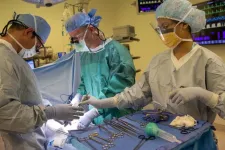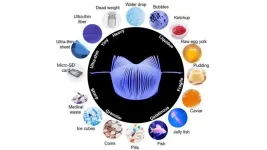(Press-News.org) RIVERSIDE, Calif. -- A study examining the effects of deportation on the health and wellbeing of noncitizen veterans who served in the United States military has found that this group is a vulnerable and often unrecognized health disparity population.
Overseen by Ann Cheney, an associate professor of social medicine, population, and public health in the School of Medicine at the University of California, Riverside, the study reports the post-deportation economic, social, and political conditions of living abroad harm veterans’ physical and psychological health. Many prioritize returning to the U.S., the country they served, to improve their quality of life.
The study, published in PLOS Global Public Health, involved interviews conducted in Tijuana, Mexico, from December 2018 to January 2019. A total of 12 male veterans who were returned to this “deportation city” participated in the research and were included in the analysis. The study used photovoice, a research method that uses photography and narrative text, to capture the veterans’ experiences. Each participant took photos and selected two or three to represent the experience of a deported veteran and was invited to comment on how the photos could inform policymakers about the social and health needs of deported veterans.
Study participants were at least 18 years of age, U.S. veterans of any service era, Mexican citizens by birth, lived in the U.S. for at least 10 years, were deported to Mexico in the last 20 years, and resided in Tijuana. The average age of the participants was 56 years and the average age at entry into the U.S. was six years.
“Our analysis of their photos and narrative text indicates that deportation caused them social, economic, and political insecurities,” Cheney said. “We found that after they were deported from the U.S., these veterans struggled to maintain access to necessities. With disruptions in their social networks, and the removal from the country many considered home, they experienced chronic stress and poor health outcomes.”
The U.S. has a total of 19 million veterans. Latinos of Mexican and Central American origin are overrepresented in the veteran population deported from the U.S. More than 80% of deported veterans report medical issues and nearly 75% lack access to healthcare after deportation. Poor physical and mental health and the effects of combat-related violence and trauma can increase homelessness, strained interpersonal relationships, substance use, legal trouble, and difficulty in maintaining employment.
“Veterans often struggle to assimilate to civilian life post-discharge, but this transition is especially risky for noncitizen veterans,” Cheney said. “It is no wonder half of our participants reported that returning to the U.S. was most important for their quality of life—many had been living in the U.S. since childhood, spoke English only, and had no family or friends in Mexico. Securing income and accessing healthcare were their next highest priorities. Our findings highlight how deportation places such groups in vulnerable positions, contributing to their stress and harming their health.”
The study also found the deported veterans:
Voiced disbelief about how the U.S. could dispose of them after they risked their lives to protect, what they considered, their country
Remained loyal to the U.S., with many indicating they would serve again in the U.S. military
Self-identified as “American” and believed the U.S. is their home
Described their situation as being stuck in “limbo,” with their lack of Spanish proficiency hindering their ability to assimilate
Experienced loss of food, housing, and medical care
Were often homeless and food insecure
Reported challenges finding and securing jobs in Mexico, with public transportation issues being a common barrier to employment
Could not contact their families for extensive periods of time, often because they felt guilty
Frequently experienced depression, loneliness, and anxiety due to feelings of helplessness and despair
Experienced chronic illness and disease, such as hypertension and diabetes
Used substances to cope with deportation.
“Without change in our nation’s policies, noncitizen veterans will continue to be present in our immigration system and face deportation charges,” Cheney said. “Attention needs to be urgently paid to addressing behavioral health conditions in this population. In Mexico, deported veterans need to be trained to speak Spanish and develop skills needed for employment. They also need immediate access to free healthcare services, specifically mental healthcare services, to cope with loss, grief, and isolation linked to the trauma of deportation.”
Cheney stressed that deported veterans need to continue their connection with their family and friends in the U.S. and establish new networks in Mexico. By connecting these veterans to community-based peer support groups, they can find community and identity with other veterans, she said.
“Non-citizen military personnel often think entering the military automatically puts them on the path to citizenship,” Cheney explained. “But that’s not true. They often think this because they are misinformed. Too often military leadership and recruiters do not know the naturalization process for non-citizen service members and misinform them, leading them to believe they are already or will become citizens. Military leaders and recruiters need training on the naturalization process, so they communicate correctly with recruits and service members. Additionally, we need reform to the immigration process to facilitate the pathway to citizenship for service members and veterans who served in the U.S. military.”
Cheney was joined in the research by project co-leader Frances Tao of UCLA, Cassidy T. Lee of the School of Osteopathic Medicine in Arizona, and Edgar Castelan of the California State Senate, San Bernardino.
The study was supported by the UCR School of Medicine and University of California Institute for Mexico and the United States (UC MEXUS).
The research paper is titled “Social Determinants of Health among Noncitizen Deported US Veterans: A Participatory Action Study.”
The University of California, Riverside is a doctoral research university, a living laboratory for groundbreaking exploration of issues critical to Inland Southern California, the state and communities around the world. Reflecting California's diverse culture, UCR's enrollment is more than 26,000 students. The campus opened a medical school in 2013 and has reached the heart of the Coachella Valley by way of the UCR Palm Desert Center. The campus has an annual impact of more than $2.7 billion on the U.S. economy. To learn more, visit www.ucr.edu.
END
Study exposes plight of deported noncitizen veterans
UC Riverside-led research shows how deportation acts as a social determinant of health
2023-08-02
ELSE PRESS RELEASES FROM THIS DATE:
Lockdowns create global appetite for feeding feathered friends
2023-08-02
A team of researchers have highlighted the role that the COVID-19 pandemic played in connecting people around the world more with our feathered friends while in lockdowns, finding a surge in interest for bird feeding information and providing more insight into global human-birds interactions.
Professor Emeritus Darryl Jones, from Griffith’s Centre for Planetary Health and Food Security, and the research team used Google search index (a valid proxy parameter from Google Trends data) and found a surge of interest in bird feeding in 115 countries after Covid-19 led to lockdowns where people stayed home.
Professor Jones, alongside lead author Associate Professor ...
Researchers discover a novel pathway that minimizes liver injury during transplantation
2023-08-02
UCLA-led research describes the role that a protein called CEACAM1 plays in protecting the liver from injury during the transplantation process, potentially improving transplant outcomes. But the features that regulate this protective characteristic remain unknown.
In a new study, to be published online Aug. 2 in Science Translational Medicine, a research team has identified the molecular factors at the root of this protection and shown how using molecular tools and alternative gene splicing can make CEACAM1 more protective, thus reducing organ injury and ultimately improving post-transplant outcomes.
Prior to transplantation, a solid organ, such as a liver, has no ...
UIC leads field study on home, water safety after Ohio chemical spill
2023-08-02
In February, the train derailment and subsequent chemical spill and fires in East Palestine, Ohio, caused an environmental emergency that led thousands of people to evacuate their homes. A multi-university study led by the University of Illinois Chicago will investigate the aftermath of that disaster, collecting data on the experiences of nearby residents and the effectiveness of communication from authorities about water, soil and air quality.
For the study, the researchers will conduct surveys and interviews with residents in and near East Palestine, including counties ...
MD Anderson research highlights for August 2, 2023
2023-08-02
HOUSTON ― The University of Texas MD Anderson Cancer Center’s Research Highlights showcases the latest breakthroughs in cancer care, research and prevention. These advances are made possible through seamless collaboration between MD Anderson’s world-leading clinicians and scientists, bringing discoveries from the lab to the clinic and back.
Recent developments include a novel biomarker that may predict the aggressiveness of pancreatic cancer precursors, insights into the structure and function of a breast and ovarian cancer susceptibility gene, a new approach to overcoming treatment resistance in ovarian cancer, distinguishing features of young-onset ...
August issues of American Psychiatric Association journals cover alcohol use disorder, interventions for PTSD and psychedelics in psychiatry
2023-08-02
The latest issues of three of the American Psychiatric Association’s journals, The American Journal of Psychiatry, Psychiatric Services and Focus are now available online.
The August issue of The American Journal of Psychiatry on the neurodevelopmental origins of psychopathology is focused on early-life adversity and genetics as mediators of the risk to develop psychiatric illnesses. Highlights include:
Overview of Alcohol Use Disorder.
A Comprehensive Multilevel Analysis of the Bucharest Early Intervention Project: Causal Effects on Recovery from Early Severe Deprivation. ...
Eyewitnesses to Arctic Change
2023-08-02
On Thursday, 3 August 2023, the research vessel Polarstern is scheduled to set off from Tromsø, Norway, towards the North Pole. For two months, a good fifty scientific expedition participants will explore the Arctic in transition as sea ice extent reaches its annual minimum in September. They will explore the biology, chemistry and physics of sea ice as well as the effects of sea ice retreat on the entire ocean system from the surface to the deep sea. Eleven years ago, Antje Boetius was part of the largest ever sea ice minumum in the Arctic ...
New neuroimaging approach could improve diagnosis of schizophrenia
2023-08-02
ATLANTA — New research led by scientists working with Georgia State University’s TReNDS Center has identified age-related changes in brain patterns associated with the risk for developing schizophrenia.
The discovery could help clinicians identify the risk for developing mental illness earlier and improve treatment options. The study is published in the Proceedings of the National Academy of Sciences (PNAS).
The research is part of a collaboration by experts from the University of Bari Aldo Moro, the Lieber Institute of Brain Development and the Tri-institutional Center for Translational Research in ...
Scientists discover unusual ultrafast motion in layered magnetic materials
2023-08-02
A common metal paper clip will stick to a magnet. Scientists classify such iron-containing materials as ferromagnets. A little over a century ago, physicists Albert Einstein and Wander de Haas reported a surprising effect with a ferromagnet. If you suspend an iron cylinder from a wire and expose it to a magnetic field, it will start rotating if you simply reverse the direction of the magnetic field.
“Einstein and de Haas’s experiment is almost like a magic show,” said Haidan Wen, a ...
New review calls on Hockey Canada to raise age of body contact from 13 to 15
2023-08-02
Hockey leagues in Canada should overhaul current rules and regulations to raise the age of bodychecking in the game from 13 to 15, says new research into the effect of body contact on teens.
The literature review was led by Dr. Kristian Gouletnorth_eastexternal link of the University of Ottawa’s Faculty of Medicine and Children’s Hospital of Eastern Ontario (CHEO) and calls on provincial and territorial governments to mandate schools – including those involved with school sports – and sports organizations to establish, ...
Robotic grippers offer unprecedented combo of strength and delicacy
2023-08-02
Researchers at North Carolina State University have developed a robotic gripping device that is gentle enough to pick up a drop of water, strong enough to pick up a 6.4 kilogram (14.1 pound) weight, dexterous enough to fold a cloth, and precise enough to pick up microfilms that are 20 times thinner than a human hair. In addition to possible manufacturing applications, the researchers also integrated the device with technology that allows the gripper to be controlled by the electrical signals produced by muscles in the forearm, demonstrating its potential for use with robotic prosthetics.
“It is difficult ...
LAST 30 PRESS RELEASES:
Kidney cancer study finds belzutifan plus pembrolizumab post-surgery helps patients at high risk for relapse stay cancer-free longer
Alkali cation effects in electrochemical carbon dioxide reduction
Test platforms for charging wireless cars now fit on a bench
$3 million NIH grant funds national study of Medicare Advantage’s benefit expansion into social supports
Amplified Sciences achieves CAP accreditation for cutting-edge diagnostic lab
Fred Hutch announces 12 recipients of the annual Harold M. Weintraub Graduate Student Award
Native forest litter helps rebuild soil life in post-mining landscapes
Mountain soils in arid regions may emit more greenhouse gas as climate shifts, new study finds
Pairing biochar with other soil amendments could unlock stronger gains in soil health
Why do we get a skip in our step when we’re happy? Thank dopamine
UC Irvine scientists uncover cellular mechanism behind muscle repair
Platform to map living brain noninvasively takes next big step
Stress-testing the Cascadia Subduction Zone reveals variability that could impact how earthquakes spread
We may be underestimating the true carbon cost of northern wildfires
Blood test predicts which bladder cancer patients may safely skip surgery
Kennesaw State's Vijay Anand honored as National Academy of Inventors Senior Member
Recovery from whaling reveals the role of age in Humpback reproduction
Can the canny tick help prevent disease like MS and cancer?
Newcomer children show lower rates of emergency department use for non‑urgent conditions, study finds
Cognitive and neuropsychiatric function in former American football players
From trash to climate tech: rubber gloves find new life as carbon capturers materials
A step towards needed treatments for hantaviruses in new molecular map
Boys are more motivated, while girls are more compassionate?
Study identifies opposing roles for IL6 and IL6R in long-term mortality
AI accurately spots medical disorder from privacy-conscious hand images
Transient Pauli blocking for broadband ultrafast optical switching
Political polarization can spur CO2 emissions, stymie climate action
Researchers develop new strategy for improving inverted perovskite solar cells
Yes! The role of YAP and CTGF as potential therapeutic targets for preventing severe liver disease
Pancreatic cancer may begin hiding from the immune system earlier than we thought
[Press-News.org] Study exposes plight of deported noncitizen veteransUC Riverside-led research shows how deportation acts as a social determinant of health






